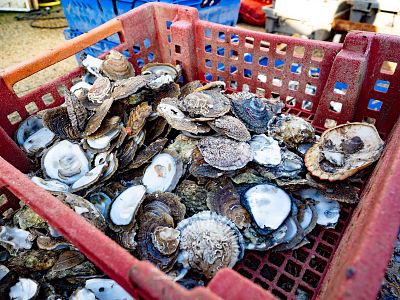"Everything's just fallen apart," said Tom Haward, the eighth generation of Hawards to work the family's 300-year-old business.
WEST MERSEA, England — When Rome colonized Britain in 43 A.D., it found its inhabitants uncouth and backward, but they did have one thing going for them, according to the Roman historian Sallust: "Poor Britons, there is some good in them after all. They had produced an oyster."British shellfish are still popular in Europe, which takes almost all of the country's output, but Brexit looks set to be a huge barrier to exporting oysters to modern day Romans and others on the Continent. With almost all of the country's shellfish being exported, the trade barriers — not to mention shipping delays — of a disorderly exit from the E.U. could devastate the ancient sector.Leaving the European Union without a divorce deal could see chaos at the border, new export paperwork and tariffs that could kill shellfish sales to Britain's nearest neighbors."It's all been a bit of a nightmare," said Tom Haward of Richard Haward's Oysters, based in West Mersea near the ancient Roman town of Colchester in southeast England.
Sporting a deep tan and a large bushy black beard, Haward, 38, is the eighth generation of his family to harvest oysters."I've been trying to expand our export market, and because of Brexit everything's just fallen apart. I can't get into other markets because Brexit rules everything."While the country is fixated on Britain's Brexit-induced parliamentary meltdown, the political uncertainty is causing real harm to British shellfish exporters, among others.Businesses that sell shellfish to the E.U. were worth 360 million pounds in 2015 ($549 million), a relatively small sum but a crucial source of income for small family-run operations such as Haward's.The majority of British businesses are small and medium-sized enterprises, which the country's Federation of Small Businesses says need urgent government support to deal with "a worrying lack of preparedness for a no-deal Brexit."
Shellfish exporters could develop markets outside Europe but striking new deals is difficult while Britain's E.U. status remains unclear, Haward said."We are trying to get stuff to China but that's been delayed by months and months because Brexit's made everything slow down," he said."Japan said because they've just done a free trade deal with Europe they're not going to take anything from Britain because Britain needs to sort themselves out."The U.K. voted to leave the E.U. in 2016, but political wrangling since has cast doubt on how and when it will depart.Prime Minister Boris Johnson says Britain will leave the bloc on Oct. 31 with or without a divorce deal, "do or die," but almost all experts say leaving without a deal would damage the economy, increase bureaucracy and cause major disruption at ports.Few industries are more at risk than Britain's shellfish industry."We are in a very vulnerable situation. Very roughly 86 percent of all shellfish landed in the U.K. is exported, and the vast majority of that is exported to our European counterparts," the director of the Shellfish Association of Great Britain, David Jarrad, told NBC News."Delays at the border inspection posts on the other side of the channel will be critical. The product starts to devalue almost by the hour if it's stuck in a lorry."
Adding to the problem, British shellfish will be more expensive after the country falls outside of the union because of an estimated E.U. import tariff of around 10 percent.In the absence of exports, Haward has reoriented his 300-year-old family business toward the domestic market, but the competition is fierce and the demand fragile."People aren't spending as much money," he said. "Oysters are definitely not something people think are essential, and they'll cut them out straight away. So the uncertainty Brexit's put on the country has definitely impacted us."Parliament in early September passed a law that would force Johnson to seek a deadline extension if there is no exit deal by Oct. 31. But he insists Britain will leave regardless, adding to a sense of political chaos that has upended hundreds of years of parliamentary convention.Businesses have been encouraged to prepare for all scenarios — a heavy burden for small firms."I've spent hours and hours and hours researching Brexit. I've got a folder which is stuffed full of information about it and about the potential impact of no deal, or if there is a deal, or one type of deal over another type of deal, about tariffs, health certificates, border inspections," Haward said."Everything could change again. Because it feels like no one at the top knows what's happening, so why should we as very, very small businesses know what's going on?"














